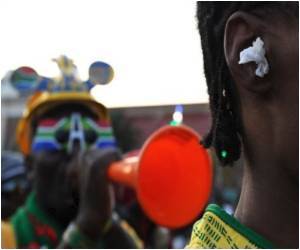
Pilgrims will make the journey over the course of July to walk along the dirt roads of the poor settlement that lies within sight of Durban's World Cup stadium.
This year's pilgrimage is especially poignant, coming as the church is finalising a deal with the manufacturer of the plastic vuvuzela trumpets that now symbolise South Africa's World Cup.
Under the agreement, Shembe will be recognised as the inventor of the vuvuzela, an instrument his followers say he created a century ago using antelope horns.
"We saw Bill Clinton blowing in a vuvuzela in a stadium. It makes us very proud. It is good for the church," said Enoch Thembu, spokesman for the evangelical church which claims 5.2 million followers across southern Africa.
The pilgrimage in their holy month of July is far removed from the World Cup celebrations in Durban, where surfers and bikini-clad fans watch games on jumbo screens on the beach to the relentless hum of vuvuzelas -- a noise seen either as joyous or maddening.
Advertisement
"It's all in the blowing," explained Thembu.
Advertisement
To the sound of hymns accompanied by imbomus, the pilgrims known simply as the Shembe enter a field dominated by the statue of their founder, considered an African Messiah.
Men with walking sticks and women in traditional hats or white veils erupt into cheers at the mere glimpse of one of Shembe's descendants behind a window.
Mixing Christianity and African traditions, the Shembe base their beliefs on the Old Testament. They practise polygamy, and they avoid pork.
The village's shops sell leopard skins and springbok tails, elements of traditional dress. Sex is forbidden during the pilgrimage, as is medication. Any ailments are treated with prayers, water and Vaseline.
Before entering, the faithful must purify themselves by donating a small amount of money.
Despite their traditional beliefs, the Shembe have big ambitions for their newly recognised claim to the vuvuzela.
They want to claim intellectual property rights to the instrument and cash in on its manufacturing.
"Our aim is to make jobs for South African workers and to generate some income for the church to look after the widows, the orphans and the destitute people," Thembu said.
According to him, South African firm Masincedane Sport made at least 60 million plastic vuvuzelas before the World Cup, and the Shembe want at least a small slice of that pie.
"We have to give a job to all these people," Thembu said.
Source-AFP








